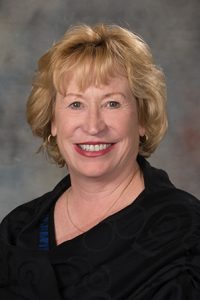Higher sales tax rate considered
The Revenue Committee heard testimony Feb. 7 on a proposal to increase Nebraska’s sales tax rate from 5.5 to 6.5 percent beginning Oct. 1.

Elkhorn Sen. Lou Ann Linehan, sponsor of LB1315, said the bill is part of a larger package of proposals to raise state revenue in order to provide additional property tax relief. She said property taxes, which are collected by local governments, make up the largest portion of taxes paid by Nebraskans at over $5 billion per year, compared to roughly $3 billion in income taxes and $2 billion in sales taxes.
Linehan said the state already devotes approximately $1 billion per year to two property tax relief programs. LB1315 would generate a portion of the additional $1 billion per year needed to achieve Gov. Jim Pillen’s goal of reducing statewide property tax collections by 40%, she said.
The state Department of Revenue estimates that the bill would increase state general fund revenue by approximately $305 million in fiscal year 2024-25, $467 million in FY2025-26 and $485 million in FY26-27.
Bruce Rieker testified in support of LB1315 on behalf of the Nebraska Farm Bureau and eight other agricultural organizations. He said property taxes have grown at an “unsustainable” rate beginning with the Great Recession, when the Legislature cut state aid to local governments and shifted more of the responsibility for funding public education onto property owners.
Rieker said agricultural groups are “steadfast” that approximately $1 billion in additional property tax relief is needed to counteract that shift and to match state income tax cuts the Legislature passed last year.
Testifying in opposition to the bill on behalf of the Platte Institute was Jim Smith, who said it would be unfair to taxpayers to raise the sales tax rate in order to subsidize spending at the local level.
If lawmakers need to generate additional sales tax revenue to provide property tax relief, he said, they instead should broaden Nebraska’s sales tax base, which currently is “riddled with exclusions and exemptions that favor some over others.”
“Increasing the existing sales tax rate without modernizing the tax code only serves to reduce Nebraska’s competitiveness with border states and increase the bias of the current system,” Smith said.
Rebecca Firestone of OpenSky Policy Institute also testified in opposition, saying the proposed tax shift would continue the trend of making Nebraska’s tax code more regressive.
She said increasing the sales tax rate would raise the prices of things all Nebraskans pay for, including items that could be considered necessities such as cars, clothing and school supplies. This would disproportionately affect families with low incomes, who pay a greater percentage of their earnings in sales taxes than those with higher incomes, Firestone said.
John Gage testified in opposition to the bill on behalf of Americans for Prosperity. He said raising the sales tax rate to reduce property taxes would benefit wealthy landowners at the expense of “average Joes.”
“Long term and prudent tax reform will only be achieved when the Legislature has the courage to limit spending [by] local governments, especially schools,” Gage said.
Bryan Slone testified in opposition to LB1315 on behalf of the Nebraska Chamber of Commerce and Industry, the Lincoln Chamber of Commerce, the Nebraska Bankers Association and the National Federation of Independent Business.
The groups support other proposals introduced this session to limit the growth of local property tax collections, Slone said, but they are concerned about the proposed tax shift’s effects on Nebraska’s workforce.
“In a tax shift,” he said, “somebody’s picking up the tab on the other side.”
The committee took no immediate action on LB1315.

